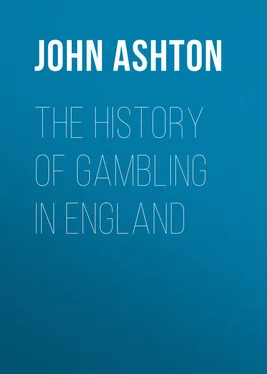John Ashton - The History of Gambling in England
Здесь есть возможность читать онлайн «John Ashton - The History of Gambling in England» — ознакомительный отрывок электронной книги совершенно бесплатно, а после прочтения отрывка купить полную версию. В некоторых случаях можно слушать аудио, скачать через торрент в формате fb2 и присутствует краткое содержание. Жанр: foreign_antique, foreign_prose, на английском языке. Описание произведения, (предисловие) а так же отзывы посетителей доступны на портале библиотеки ЛибКат.
- Название:The History of Gambling in England
- Автор:
- Жанр:
- Год:неизвестен
- ISBN:нет данных
- Рейтинг книги:5 / 5. Голосов: 1
-
Избранное:Добавить в избранное
- Отзывы:
-
Ваша оценка:
- 100
- 1
- 2
- 3
- 4
- 5
The History of Gambling in England: краткое содержание, описание и аннотация
Предлагаем к чтению аннотацию, описание, краткое содержание или предисловие (зависит от того, что написал сам автор книги «The History of Gambling in England»). Если вы не нашли необходимую информацию о книге — напишите в комментариях, мы постараемся отыскать её.
The History of Gambling in England — читать онлайн ознакомительный отрывок
Ниже представлен текст книги, разбитый по страницам. Система сохранения места последней прочитанной страницы, позволяет с удобством читать онлайн бесплатно книгу «The History of Gambling in England», без необходимости каждый раз заново искать на чём Вы остановились. Поставьте закладку, и сможете в любой момент перейти на страницу, на которой закончили чтение.
Интервал:
Закладка:
The Grub Street Journal of 28 Dec. 1733, gives a practical hint how to utilise Gambling: “Dear Bavy . – As Gaming is becoming fashionable, and the Increase of the Poor a general Complaint, I propose to have a Poor’s Box fix’d up in some convenient Place in every House, which may contain all Money that shall be won at Cards, or any other Games; and that a proper Person be appointed in every Parish to keep the Key, and to collect Weekly from each House what has been dropt into the Box, in order to distribute it among the poor, every Sunday . A Friend of mine, being obliged to play pretty high in a Family, where he visited, had, generally, Luck on his Side. In some time, the Master of the Family became extreamly embarrass’d in the World. My Friend, being acquainted with it, and touch’d with so moving a Circumstance, went home, and, opening a Drawer where he had deposited the Winnings brought from his House, repaid him; thereby, he retrieved his Credit, and whereby the whole Family was saved from Ruin. – Yours &c., Jeremy Hint.”
Another letter in the same Journal, 2 Sept. 1736, shows how the canker of gambling was surely eating into the very heart of the nation. It is à propos of private Gaming Houses. “I beg leave, through your Means, to make a few Remarks upon the great Encrease of a Vice, which, if not timely prevented, will end in the Ruin of the young and unwary of both Sexes; I mean, Play in private Houses, and more particularly that artful and cheating Game of Quadrille . It is the constant business of the Puffs who belong to the Gaming Societies, to make a general Acquaintance, and, by a Volubility of Tongue, to commend Company and Conversation: to advise young People, or those who have but lately come to Town, to improve themselves in the Beau Monde . The young and unwary, thro’ their Inexperience, greedily swallow this Advice, and deliver themselves up to the Conduct of these Harpies who swarm in every Corner, where Visiting is in Fashion: by whom they are introduced into these polite Families, and taught to lose their Money and Reputation in a genteel Manner. These Societies consist mostly of two or three insignificant old Maids, the same number of gay Widows; a batter’d old Beau or two, who, in King William’s time, were the Pink of the Mode: The Master of the House, some decay’d Person of a good Family, made use of merely as a Cypher to carry on the Business, by having the Honour to be marry’d to the Lady, who, to oblige her Friends and People of good Fashion only, suffers her House to be made use of for these Purposes. In these places it is that young Ladies of moderate Fortunes are drawn in, to the infallible Ruin of their Reputations; and when, by false Cards, Slipping, Signs, and Crimp, they are stript of their last Guinea, their wretched companions will not know them. Any one acquainted with the West End of the Town cannot but have observed all this with Regret, if they have Honour and Compassion in them. Nor need I mention the West End only. I believe all Points of the Compass are infected, and it were to be wished a Remedy could be found out to prevent it.”
An attempt to remedy this state of things was made, in 1739, by passing “an Act for the more efficient preventing of excessive and deceitful gaming” (12 Geo. II. c. 28), which provided that the Person that keeps a house, or other place, to game in, forfeits £200, half to the prosecutor, and half to the poor of the parish, except at Bath, where the half goes to poor in the Hospital. Lotteries, Sales, Shares in Houses to be determined by Lottery, Raffle, &c., are under this Act, the Lands, Houses, &c. forfeited. All persons gaming in the places aforesaid, or adventurers in Lotteries, on conviction forfeit £50. The games forbidden are Ace of Hearts, Faro, Basset and Hazard, except in Royal Palaces. Justices of Peace refusing to act and convict on this Act forfeit £10.
But this Act did not go far enough, and it was amended by the 18 Geo. II. c. 34. The Journals of the House of Lords have a curious story to tell about this Act.
“ Dies Lunæ , 29 Aprilis 1745 . The House (according to Order) was adjourned during Pleasure, and put into Committee upon the Bill intituled ‘An Act to amend, explain, and make more effectual, the Laws in being, to prevent excessive and deceitful Gaming: and to restrain and prevent the excessive Increase of Horse Races.’
After some time the House was resumed.
And the Earl of Warwick reported from the said Committee that they had gone through the Bill, and made some Amendments thereto; which he would be ready to report, when the House will please to receive the same.
Ordered. That the Report be received to-morrow.
The House being informed ‘That Mr Burdus, Chairman of the Quarter Sessions for the City and Liberty of Westminster, Sir Thomas de Veil, and Mr Lane, Chairman of the Quarter Sessions for the County of Middlesex, were at the door.’
They were called in, and, at the Bar, severally gave an account that claims of privilege of Peerage were made, and insisted on, by the Ladies Mordington and Casselis, in order to intimidate the peace officers from doing their duty in suppressing the public gaming houses kept by the said Ladies.
And the said Burdus thereupon delivered in an instrument in writing, under the hand of the said Lady Mordington, containing the claim she made of privilege for her officers and servants employed by her in the said gaming house.
And then they were directed to withdraw.
And the said Instrument was read, as follows: —
‘I, Dame Mary, Baroness of Mordington, do hold a house in the Great Piazza, Covent Garden, for and as an Assembly, where all persons of credit are at liberty to frequent and play at such diversions as are used at other Assemblys. And I have hired Joseph Dewberry, William Horsely, Ham Cropper, and George Sanders, as my servants, or managers, (under me) thereof. I have given them orders to direct the management of the other inferior servants, (namely) John Bright, Richard Davis, John Hill, John Vandenvoren, as box-keepers. Gilbert Richardson, housekeeper, John Chaplain, regulator, William Stanley and Henry Huggins, servants that wait on the Company at the said Assembly, William Penny and Joseph Penny, as porters thereof. And all the above mentioned persons I claim as my domestick servants, and demand all those privileges that belong to me, as a Peeress of Great Britain, appertaining to my said Assembly. M. Mordington. Dated 8 Jan. 1745.’
Resolved and declared that no Person is entitled to Privilege of Peerage against any prosecution, or proceeding, for keeping any public or common gaming house, or any house, room, or place for playing at any game, or games prohibited by any law now in force.”
These ladies had already been presented by the Grand Jury for the County of Middlesex on 10 May 1744, together with the proprietors of the avenues leading to and from the several Playhouses in Covent Garden and Drury Lane, the proprietors of Sadler’s Wells, and the proprietors of New Wells in Goodman’s Fields, The London Spaw, Clerkenwell, and Halden’s New Theatre, in May Fair.
One of the most curious anecdotes of gambling, about this date, is the following 26 26 Local Records, &c., of Remarkable events. Compiled by John Sykes. Newcastle, 1824, p. 79.
: – “1735. Oct. A child of James and Elizabeth Leesh of Chester le street, was played for at cards, at the sign of the Salmon, one game, four shillings against the child, by Henry and John Trotter, Robert Thomson and Thomas Ellison, which was won by the latter, and delivered to them accordingly.”
The law was occasionally put in motion, as we find. “ Gent. Mag. , Oct. 31, 1750. About 9 o’clock at night, a party of soldiers and constables, with proper warrants, enter’d a notorious gaming house, behind the Hoop tavern in the Strand , and seiz’d 36 gamblers, and carry’d them to the vestry room at St Martin’s , where the justices were sitting for that purpose; 21 of them, next morning, for want of bail, were committed to the Gatehouse , and the others bound in a recognizance of £80, to answer at the next Sessions; the fine gaming tables, which cost £200, were chopt to pieces, and a great part burnt.”
Читать дальшеИнтервал:
Закладка:
Похожие книги на «The History of Gambling in England»
Представляем Вашему вниманию похожие книги на «The History of Gambling in England» списком для выбора. Мы отобрали схожую по названию и смыслу литературу в надежде предоставить читателям больше вариантов отыскать новые, интересные, ещё непрочитанные произведения.
Обсуждение, отзывы о книге «The History of Gambling in England» и просто собственные мнения читателей. Оставьте ваши комментарии, напишите, что Вы думаете о произведении, его смысле или главных героях. Укажите что конкретно понравилось, а что нет, и почему Вы так считаете.












